|
|
|
Sort Order |
|
|
|
Items / Page
|
|
|
|
|
|
|
| Srl | Item |
| 1 |
ID:
180564
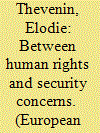

|
|
|
|
|
| Summary/Abstract |
For the past few decades, the increased perception of migration as an issue in Europe resulted in the development of the externalisation of the EU’s migration governance to third countries. EU-Turkey and EU-Libya cooperation frameworks on migration have in this perspective been established in the wake of the 2015 migration crisis and triggered major controversies. The agreements received fierce contestation from non-governmental and international actors, highlighting the poor protection of human rights through this management. This paper analyses the dynamics of politicisation of EU-Turkey and EU-Libya agreements on migration in domestic political discourse. A qualitative comparison between German, French and Polish parliamentary debates constitutes the main empirical basis of this research. The analysis focuses on the different patterns of politicisation with emphasis on contesting arguments. This paper examines members of parliaments’ stances on EU-Turkey and EU-Libya cooperation focusing on humanitarian and securitisation frames. Results demonstrate an uneven process of politicisation in national parliaments dependent on the robustness of parliamentary majority and political parties’ issue positions. Overall, the analysis of discourse on the two agreements clearly illustrates the prioritisation of security over human rights when it comes to migration management.
|
|
|
|
|
|
|
|
|
|
|
|
|
|
|
|
| 2 |
ID:
180559
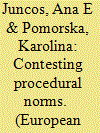

|
|
|
|
|
| Summary/Abstract |
While there is increasing evidence in the literature of politicisation in the area of European foreign policy, we know less about how this has affected the dynamics of cooperation among EU member states and, specifically, the procedural norms that govern this policy. This article is concerned with how politicisation and contestation manifest at the micro-level and how they might shape everyday EU foreign policy negotiations. It seeks to establish to what extent politicisation – resulting from the emergence of a new political cleavage centred around issues of identity and supranational integration – has driven normative contestation within EU foreign policy negotiations and whether this has led to the erosion of long-standing procedural norms in European foreign policy. Our findings suggest that despite CFSP Council committees being an institutional arena, characterised by intergovernmental, relatively insulated, and technical decision-making, current processes of politicisation linked to the rise of populism and the increasing transfer of authority to the EEAS have increased contestation of norms within this setting. However, procedural norms have remained relatively resilient to these challenges.
|
|
|
|
|
|
|
|
|
|
|
|
|
|
|
|
| 3 |
ID:
180561


|
|
|
|
|
| Summary/Abstract |
The cosmopolitan character of the International Criminal Court (ICC) is not immune to the growing surge in the contestation of international institutions. The African Union’s reaction to the ICC decision to indict the then sitting heads of state of Sudan and Kenya, and the actions undertaken by the Trump Administration against the Court over possible investigations into Afghanistan and Palestine, are cases in point. This article explores what that surge has meant for intra-EU debates on its position towards the ICC. We present a two-fold argument based on an empirical analysis of key moments in the institutional development of the Court that coincide with the pre- and post-rise phases in the politicisation of international institutions. First, the level of agreement on the ICC within the EU has been grossly exaggerated. Second, despite bouts of disagreement, patterns of political conflict over the ICC within the EU remain constant. That is, there is recurrent polarisation, with a range of opinions on the intractable debate about Westphalian sovereignty vs. cosmopolitan justice, but no change in the other two dimensions of politicisation (salience and actor range).
|
|
|
|
|
|
|
|
|
|
|
|
|
|
|
|
| 4 |
ID:
180560
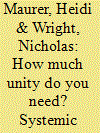

|
|
|
|
|
| Summary/Abstract |
The Common Foreign & Security Policy (CFSP) is a transnational policy framework to deliver collective foreign policy and also to manage differences among member states. As such, it has always been dependent on their support. Since 2019, however, disagreement within this system is said to have reached a new level. Taking this political trend as our starting point, this article proposes a new, conceptual approach to understanding how contestation challenges the EU’s foreign policy cooperation system. While the majority of research focuses on disagreements in decision-making, we argue for a broader conceptualisation – systemic contestation. Drawing on norm contestation scholarship, we argue that systemic contestation manifests itself in two ways: as passive contestation, when member states disengage from and fail to take ownership of CFSP initiatives and their implementation; and as tacit contestation, when they fail to act when faced with the need to safeguard the system. This approach accounts for the transgovernmental character of the CFSP; and the central role of member states within it. Finally, we contend that our conceptualisation of systemic contestation offers promising new avenues for empirical research to understand the “black box” of EU foreign policy cooperation.
|
|
|
|
|
|
|
|
|
|
|
|
|
|
|
|
| 5 |
ID:
180557
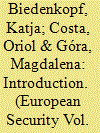

|
|
|
|
|
| Summary/Abstract |
Contestation and politicisation are two concepts of increasing relevance to European foreign and security policy (CFSP) scholars and practitioners alike. However, reasonable doubts can be raised as regards this growing literature: first, political conflict has always been part of CFSP, and national and European politics have traditionally been at the centre of research in this field. Second, exploring how the two concepts relate to European foreign, security and defence policies is complicated by the fact that foreign affairs more broadly do not meet all the criteria set by the literature on politicisation, which usually requires that some form of mass mobilisation takes place, or at least a high degree of salience. This article addresses these concerns by looking at the changing politics of CFSP. As the introduction to the special issue, we explore the hypothesis that contestation of European foreign, security and defence policy is now more in line with the broader way in which political conflict is being re-structured in Europe. If this is so, political conflict over CFSP will more easily be associated with issues that have an appeal beyond the narrow community of its practitioners and observers.
|
|
|
|
|
|
|
|
|
|
|
|
|
|
|
|
| 6 |
ID:
180563
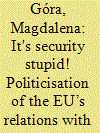

|
|
|
|
|
| Summary/Abstract |
The European Union’s security depends on how stable and peaceful its neighbours are, and yet the security situation around it has been deteriorating in recent years. The EU policies designed to stabilise the neighbourhood – the European Neighbourhood Policy (ENP) and EU enlargement – were originally designed as “low politics” of foreign policy focusing on economic instruments and tools of democratisation, but in time security became a prime concern. The article firstly shows how the European Parliament and national parliaments narrate these challenges in the neighbourhood and how security-related concerns become central to the ENP and enlargement. Secondly, in capturing the security concerns, it also shows how such changes contribute to the politicisation of relations with neighbours and how these processes differ between national and supranational level. Empirically, the politicisation of the ENP and EU enlargement in national parliaments (the UK, Poland and Ireland) and the European Parliament between 2004 and 2014 is compared and analysed.
|
|
|
|
|
|
|
|
|
|
|
|
|
|
|
|
| 7 |
ID:
180562


|
|
|
|
|
| Summary/Abstract |
The USA is one of the “geopolitical others” of the European Union. Different geopolitical worldviews and normative commitments, therefore, often clash when relations with the USA are at stake. Whereas most analyses focus on differences between EU member states and their foreign policy traditions, this paper examines to what extent and in what way politicisation is driven by party politics by studying roll call votes in the European Parliament (EP) between 2004 and 2019. We find evidence that transatlantic relations have become more politicised. We show that voting behaviour is influenced first and foremost by MEPs’ affiliation with one of the political groups, not by their nationality. Furthermore, we demonstrate that support for the USA follows a bell-curve where centrist political groups are most supportive of the USA and political groups at the far ends of the left/right spectrum are most critical. Policies towards the USA are also related to the “new politics” dimension that pits cosmopolitans against nationalists, but the correlation is weaker than the one with the traditional left/right dimension. We examine the arguments brought forward in support for political groups’ voting behaviour by analysing the parliamentary debates preceding key votes on EU-US relations.
|
|
|
|
|
|
|
|
|
|
|
|
|
|
|
|
| 8 |
ID:
180558
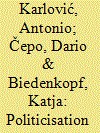

|
|
|
|
|
| Summary/Abstract |
This paper examines the response of the members of the European Council towards the EU’s sanctions policy against Russia following the 2014 Russian occupation and annexation of Crimea and the continued Ukraine crisis. The case is analysed to answer the question on the traits of the politicisation of the EU’s Russia sanctions policy. Concretely, the main research question is: what does the interplay of actor range, salience, and polarisation tell us about politicisation of CFSP in the case of sanctions policy? The secondary research question deals with how actors interact when contesting a sanctions policy to boost their success. Considering that the European Council, as the main actor in CFSP, is something of a “black box”, the paper heuristically focuses on statements (N = 223) on the sanctions policy given by its members from March 2014 till the end of 2019. The analysis shows how the politicisation of the sanctions policy seemingly entrenched itself into EUFP politics after it skyrocketed and fell in the wake of Russia’s annexation of Crimea. Finally, a latent class analysis indicates the existence of two latent coalitions with opposing views on the sanctions policy.
|
|
|
|
|
|
|
|
|
|
|
|
|
|
|
|
| 9 |
ID:
180565
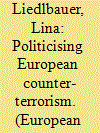

|
|
|
|
|
| Summary/Abstract |
The article examines the role of NGOs in the politicisation of EU security. The focus of the empirical analysis lies on the field of EU counter-terrorism. The cases selected are two different types of legal acts, adopted in the aftermath of serious terrorist attacks in EU member states: The EU data retention directive and the EU passenger name record (PNR) directive. These policies present intrusiveness and relevance for Brussels-based and national civil rights NGOs since they both aim to touch upon individual liberties, like privacy rights or the right to protect personal data. The article goes further by opening up the black box of politicisation. It does so by assuming that politicisation is characterised by a certain level of salience, actor range and polarisation. The paper links politicisation literature to research on the influence of interest groups that are discussing, for example, voice, access or litigation as strategies. Therewith, the paper contributes to the scientific debate on politicisation in two ways: First, it sheds light on the so far disregarded role of NGOs in politicisation. Second, it builds a bridge to interest group literature by examining repertoires of NGOs in politicisation.485-503
|
|
|
|
|
|
|
|
|
|
|
|
|
|
|
|
|
|
|
|
|